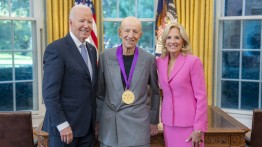Alex Katz A’49 Awarded National Medal of Arts
POSTED ON: October 25, 2024

Alex Katz A’49, recipient of a 2023 National Medal of Arts, with President and First Lady Biden. Photo courtesy of the White House.
Artist Alex Katz, who graduated from The Cooper Union School of Art in 1949, was awarded a National Medal of Arts on October 21, 2024, during a private ceremony in the East Room of the White House. Katz was honored, along with fellow recipients of the National Medals of Art and National Humanities Medals, by President Joe Biden, who was joined by First Lady Dr. Jill Biden; Maria Rosario Jackson, chair of the National Endowment for the Arts; and Shelly C. Lowe, chair of the National Endowment for the Humanities.
The National Medal of Arts is the highest award given to artists, arts patrons, and groups by the United States Government and honors exemplary individuals and organizations that have advanced the arts in America and offered inspiration to others through their distinguished achievement, support, or patronage.
Katz, who was born in Brooklyn to parents who immigrated from Russia, studied painting and drawing at Cooper under Morris Kantor. His body of work, spanning 70 years and encompassing iconic portraits, aluminum cutouts, prints, sculpture, and more, has been featured in hundreds of solo exhibitions, including a recent career retrospective at the Guggenheim Museum.
As a 2023 recipient of the National Medal of Arts, Katz was commended “for conjuring an enduring portrait of America.” The White House award citation states: “With a ferocious work ethic and visionary style, he continues to condense the complexities of everyday life into iconic faces and landscapes that reveal the essence of who we are as Americans.”
“It was completely unexpected,” Katz shared in a statement. “I’m overwhelmed by the honor—particularly, having the American government taking fine artists so seriously.”




